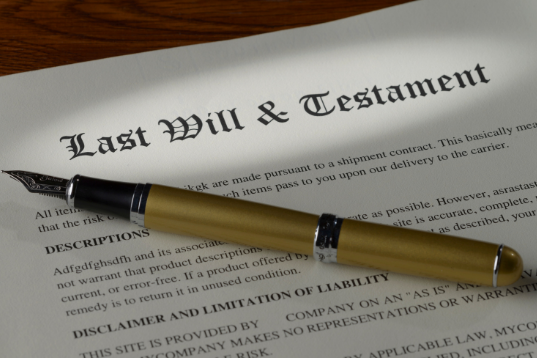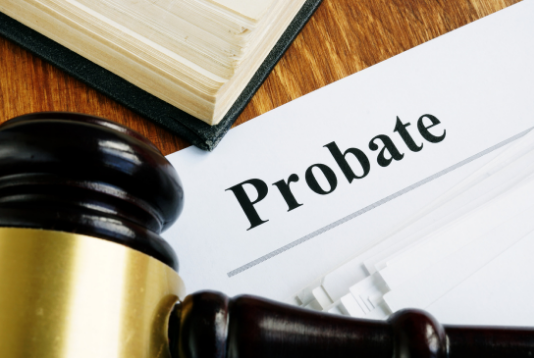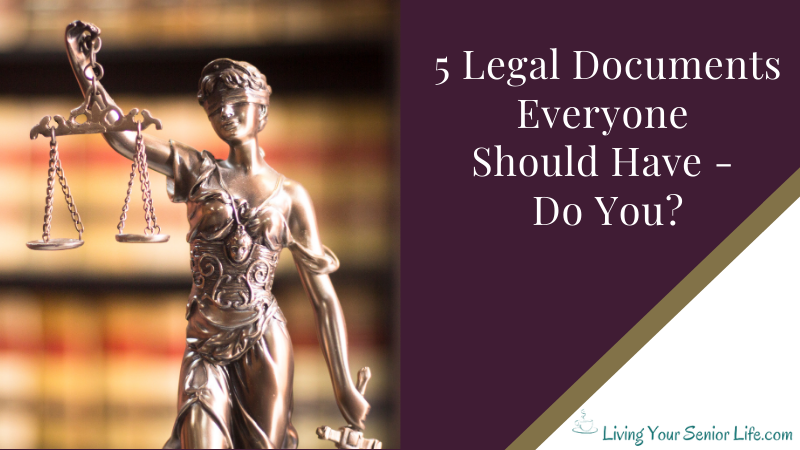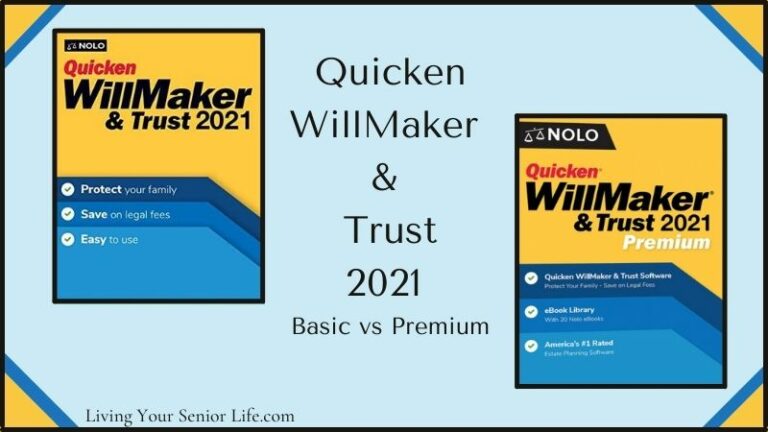Some activities are more fun than others. However, certain activities in life need to be done. And as unpleasant as estate planning may seem, you will probably feel relief once completed. In 5 Legal Documents, Everyone Should Have – Do You? we explore five important legal documents and learn what they are and why they are so important; Will, Living Trust, Advance Directive, Durable Power of Attorney, and Financial Power of Attorney.
Once the process was complete, my experience was that the nagging voice was out of my head, and a sense of relief ensued. Preparing those documents was like pulling teeth, but once done, I could relax. Sometimes just starting a process gives you enough momentum to keep going, so let’s take a look and begin – even if it’s baby steps.
This article is not intended as a substitute for an estate planning attorney or a law firm. As I’m not an attorney, I can’t advise you on your documents’ legality, or which ones your particular situation needs. Each state has different laws. If you fill out your forms yourself, you might want to have an attorney look them over to ensure your wishes are carried out as stated.
At a Glance: What 5 Legal Documents Everyone Should Have:
Legal documents are essential for protecting your rights, wishes, and assets. They can help you avoid conflicts, confusion, and costly legal fees in the future. Here are five legal documents that everyone should have:
- A Will: A Will is a document that specifies how you want your property and assets to be distributed after your death. It also names an executor who will carry out your wishes and a guardian who will take care of your minor children if you have any. A Will can help you avoid intestacy laws, which may not reflect your preferences or benefit your loved ones.
- A Living Trust: A Living Trust is a legal entity that holds your assets during your lifetime and transfers them to your beneficiaries after your death. Unlike a Will, a Living Trust does not go through probate, which is a court process that can be time-consuming, expensive, and public. A Living Trust also allows you to name a successor trustee who can manage your affairs if you become incapacitated.
- A Durable Power of Attorney: A Durable Power of Attorney is a document that authorizes someone you trust to act on your behalf in financial and legal matters if you are unable to do so yourself. This can include paying bills, filing taxes, selling property, and accessing bank accounts. A Durable Power of Attorney can help you avoid the need for a court-appointed conservator or guardian, who may not be someone you know or want.
- A Health Care Proxy: A Health Care Proxy is a document that appoints someone you trust to make health care decisions for you if you are unable to communicate or consent yourself. This can include consenting to or refusing treatments, surgeries, medications, and life-support measures. A Health Care Proxy can help you ensure that your wishes are respected and that family members and doctors are on the same page.
- A Living Will: A Living Will is a document that expresses your preferences for end-of-life care, such as whether you want to receive CPR, artificial nutrition and hydration, pain relief, and organ donation. A Living Will can help you avoid unwanted interventions and reduce the burden on your loved ones and health care providers.
For more information on each of these legal documents, please scroll down to the detailed sections below.
Video: 5 Legal Documents Everyone Should Have
What Legal Documents Should Everyone Have?
Will – Not Grace

A Will is a document that states how you want your estate handled after your death. Not a cheery thought, but it should be done.
What Information Do You Put in Your Will?
In a Will, you state who, after your death, you want to leave your items to, such as furniture, photographs, and jewelry.
If you have minor children or dependents, you can state in your Will who you want to have guardianship over them.
Another stipulation that you can put in a Will is who you want to look after your pets after your passing. Be sure to talk to the person beforehand to be sure they are willing to take on the responsibility. You can stipulate a monetary amount you are leaving for the pet’s caretaker with the intended use for your pet’s expenses (s).
What Is Not Included In a Will?
Some types of property aren’t usually covered in a Will – for instance, insurance policies and bank accounts. This is because they should have beneficiaries listed; thus, a Will usually isn’t needed. However, be sure to check that they have named beneficiaries on all accounts that allow them.
Also, now is an excellent time to update your beneficiaries. Any name changes, address changes, etc., should be updated.
You May Be Interested in Reading: Quicken WillMaker & Trust

Probate
What will happen to your property if you die without a Will? It will go through a process called probate. In probate court, a judge appoints an executor who decides how to dispose of your property.
In other words, the judge appoints someone who decides who gets what – even if it wasn’t your intent or wishes. Another reason a Will is essential.
Together or Separate?
Generally, if you have a spouse, it is suggested that you have separate Wills. Having individual Wills allows each person to have his/her wishes carried out to what happens to their separate property. This can be important if there are previous spouses and or children from other relationships.
Witnesses
Depending on your state, your Will may need to be witnessed. If so, it’s best to have someone who is not part of the Will fulfill that role. Having no interest in the matter, this person will be seen as being impartial. Some states do require two or more witnesses.
Updates
You may or may not need to update your Will. It’s a good idea to look at your Will every 2 – 3 years and when any major life events occur. Some of these events include:
- Divorce
- Marriage
- Birth of a Child
- Death of a Beneficiary
Contested
Even though you have a Will, it can be contested. When a contested Will means someone is disputing or challenging its contents. Maybe a family member feels they were slighted or believes laws regarding probate weren’t followed. Wills can also be contested if someone thinks you weren’t of sound mind or were coerced when signing the Will.
If you believe there is a possibility that someone may contest your Will, you can include a no-contest clause. This type of clause can state something to the effect that if a beneficiary challenges a Will, they will lose any inheritance stated in the Will.
The best thing to do is to be clear and concise about what you want. It’s also a good idea to have an estate attorney look over your completed estate planning documents.
Definitions
Below are some standard terms that will be helpful when considering and drawing up a Will are:
- Testator
- You Or The Person Who The Will Pertains.
- Executor
- The Person You Assign To Handle Your Estate. They Will Execute Your Will – Follow The Wishes You Stated In The Will. It Is Perfectly Fine To Have More Than One Executor.
- Estate
- Items That Belong To You. These items Might Include Large Items Such As Property Or Houses, But Also Can Include Things Like Jewelry Or Photographs.
- Intestate
- When Someone Dies Without A Will, It Usually Means That Your Estate Will Be Distributed Based On The Laws Of Your State.
- Probate
- This Is The Legal Process Of Distributing Your Property To The Rightful Heirs. This is done through probate court.
- Administrator
- If There Was No Will In Place During The Probate Process, A Judge Will Appoint An Administrator Who Will Act As The Executor. Usually, An Administrator Is Not Known To The Family And Must Follow The State’s Laws; Hence, Your Wishes May Not Be Carried Out.
Revocable Living Trust – Trust No One

A living trust will most likely be one of your primary estate planning documents. A Revocable Living Trust is a written document where you appoint someone to manage your assets if you become incapacitated or in the event of death.
Revocable Living Trusts list assets and how you want those assets handled. It’s called Living because you create it while living. It is revocable, meaning that it can be changed at any time during your lifetime, assuming you are mentally competent.
Be aware that Revocable Living Trusts need to be funded. Funding refers to transferring ownership of the property from your name to the name of the trust.
Here is a video to explain it a little more.
If you have a Revocable Living Trust, you still need a Will. Why? Because a Revocable Living Trust only covers assets with a title, such as a home, retirement account, car, etc. It doesn’t cover property such as furniture, jewelry, or photographs. You also cannot assign a guardian for dependents in a Living Trust.
Benefits of Having a Revocable Living Trust
- It Allows Someone To Make Decisions For You If You Become Incapacitated – Someone To Step In, If You Will.
- It Avoids The Expense Of the Probate Process After Death.
- It Speeds Up The Process Of Distribution Of Your Assets After Death.
- It Does Not Become Public Record After Death.
Advance Directives & Durable Power of Attorney for Health Care
Many people don’t want to think about not making medical decisions for themselves, but it can happen. Even the healthiest person can have an accident. These documents are both crucial if you are going to have surgery.
The Advance Directive and Durable Power of Attorney (Durable POA) for Health Care are two essential legal documents that give someone the power to make healthcare decisions, should you become unable to make them for yourself.
The Advance Directive puts into writing and clarifies your wishes regarding healthcare if you become unable to voice your wishes yourself. This may be because of injury, illness, or psychological issues.
A Durable POA for Health Care appoints a person to make your decisions in the event of mental incompetence. You’ll want to be clear about how the person you select should proceed with your healthcare choices.
Not having these documents in place can leave your family members and loved ones in a position to decide your health care when they may not know what you would want. Be sure to have those honest, open discussions.
Financial Power of Attorney

The Financial Power of Attorney allows someone to step in and take care of your financial matters if you aren’t able. Something as simple as paying your bills or applying for assistance can be so much easier if you have this document in place.
The Financial Power of Attorney gives whoever you appoint the right to access your bank accounts and to make financial decisions for you. Due to the power that the document gives the person you designate, choose someone you can trust to have your best interest at heart.
Because you need to be mentally competent for the document to be considered legal, it’s essential to have this document in place before you need it.
For someone to get a Financial Power of Attorney after they are incapacitated is nearly impossible. A court procedure known as guardianship or conservatorship will need to be conducted in a case like this.
Documents, Documents, Documents – Are They Necessary?

Completing your estate planning documents may seem overwhelming but can be so worthwhile. Once your important legal documents are in place, you will have peace of mind knowing that your wishes a clear, leaving your loved ones with a clear understanding of what you want.
According to best-selling author and expert money guru Suze Orman: …the biggest oversight people often make is not figuring out what will happen to their belongings when they are no longer able to make decisions. Creating a will is a good first step, but it isn’t the only document you’ll need to protect yourself and loved ones in the case of your death.
There are computer programs that assist you in creating your own legal documents. I wrote a review of the computer software program Quicken WillMaker & Trust 2024 you might find it beneficial if you are looking into creating these documents yourself.
Depending on your life circumstances, there may be other documents that you would find beneficial for you.
Again, if you prepare your documents yourself, it’s wise to consult with an estate planning attorney or law firm to look them over and make sure all the forms have been completed correctly and in line with your specific state laws.
FAQs
Can I make handwritten changes or corrections to estate documents?
Handwritten changes to legal documents can invalidate them or create confusion. Consult with an attorney to make proper amendments.
What happens to my estate documents if I move to a different state or country?
Laws regarding these documents can vary by jurisdiction. If you relocate, it’s wise to review and update your documents to ensure they comply with the laws of your new residence.
How do I store my estate documents securely?
It’s essential to store these documents in a secure location, such as a safe deposit box or with a trusted attorney. Ensure your loved ones or trusted friend knows where to find them in case of an emergency. You don’t need to discuss your personal affairs with them just be sure someone knows where they are located.
Is a living Will the same thing as an Advance Directive for Health Care?
A “Living Will” and an “Advance Directive for Health Care” (sometimes called an “Advance Healthcare Directive” or “Healthcare Proxy”) are related documents, but they serve slightly different purposes and are different.
An advance directive is a general term for any legal document that outlines your health care wishes in case you cannot speak for yourself.
A living will is a specific type of advance directive that states your preferences for medical treatment if you become terminally ill.
There are other types of advance directives as well, such as a medical power of attorney, a do-not-resuscitate order, and a portable order for life-sustaining treatment.
Related Articles
Thank you for stopping by and taking a look at 5 Legal Documents Everyone Should Have – Do You? I hope you have found some value in what you’ve read.
Do you have any experience with preparing a legal document that you would like to share? Please comment below; I would love to hear them.













Just read this article and wanted to share my thoughts. a very strong but important topic. Some individuals may not look that far into their future but after reading this, it makes me what to prepare more, thank you!
Hi Ethan,
I know sometimes completing these types of documents can be daunting and even admitting to ourselves that we’re not invincible. Once the documents are done don’t forget to revisit them every so often to be sure they are up-to-date and to make any changes needed. Thank you for reading the article and commenting.